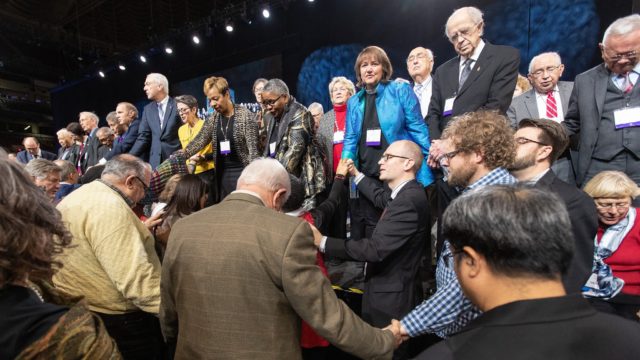
With the arching drama of the Special Session of General Conference 2019 now ended, the drama moves into the Judicial Council’s arena. The council will consider ruling on the approved Traditional Plan at its April meeting.
While the U.S. government addresses a national emergency declared by its President, rejected by its congressional House of Representatives and perhaps headed eventually to its Supreme Court, the three branches of The United Methodist Church’s governing structure are also fully engaged in lawmaking.
Catch up on the UMC’s still-evolving drama with latest reports on the outcomes of and outlook for General Conference actions taken Feb, 23-26, as well as reactions of bishops, delegates and observers.
More coverage is forthcoming this week and next, including reflections by Eastern PA Conference delegates and by resident Bishop Peggy Johnson, who will deliver a report and answer questions at West Lawn UMC March 16 and later in town hall meetings on each district.
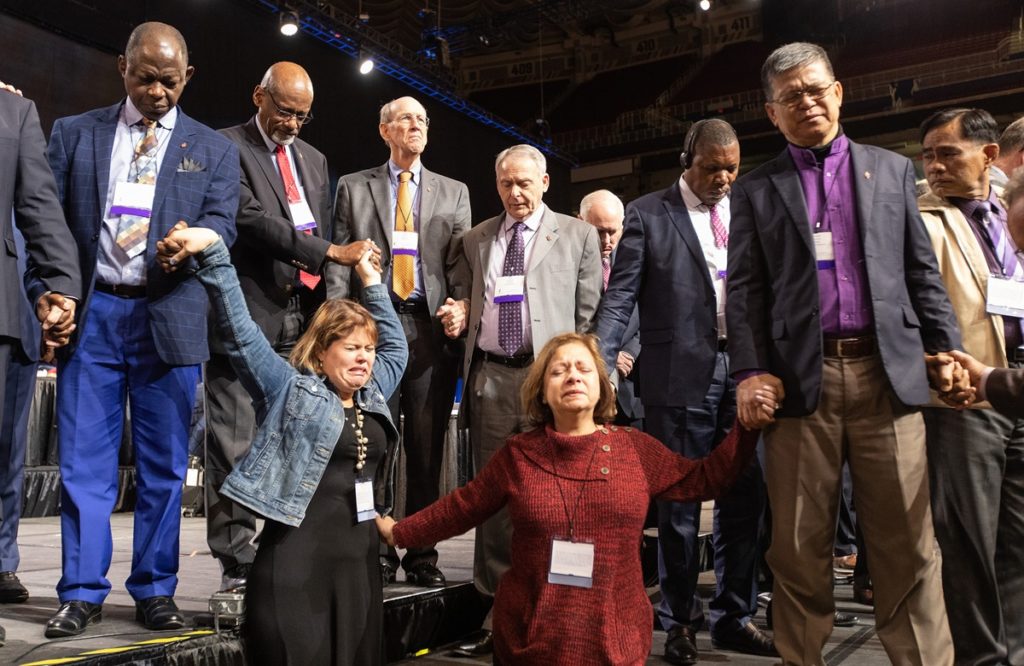
2019 General Conference passes Traditional Plan
This story, written by Kathy L. Gilbert, Heather Hahn and Joey Butler of UMNS, was published Feb. 26, at 9 PM.
On Tuesday, Feb. 26, after hours of delaying tactics by opponents, the United Methodist General Conference 2019 delegates passed The Traditional Plan 438 to 384.
A last-ditch effort to bring the One Church Plan back as a minority report was defeated in the morning and was followed by efforts to amend the Traditional Plan to address constitutionality issues raised by the Judicial Council, the church’s top court.
The approved, amended Traditional Plan affirms the church’s current bans on ordaining LGBTQ clergy and officiating at or hosting same-sex marriage. But it adds stronger enforcement provisions.
By a slim, 10-vote margin, the body also voted to request another declaratory decision by the UMC’s Judicial Council on the constitutionality of the Traditional Plan. The Judicial Council will address the request at its next scheduled meeting April 23-25 in Evanston, Illinois.
The Rev. Gary Graves, secretary of General Conference, said any piece of legislation that the Judicial Council declares unconstitutional will not be included in the Book of Discipline, the denomination’s policy book. Learn more…
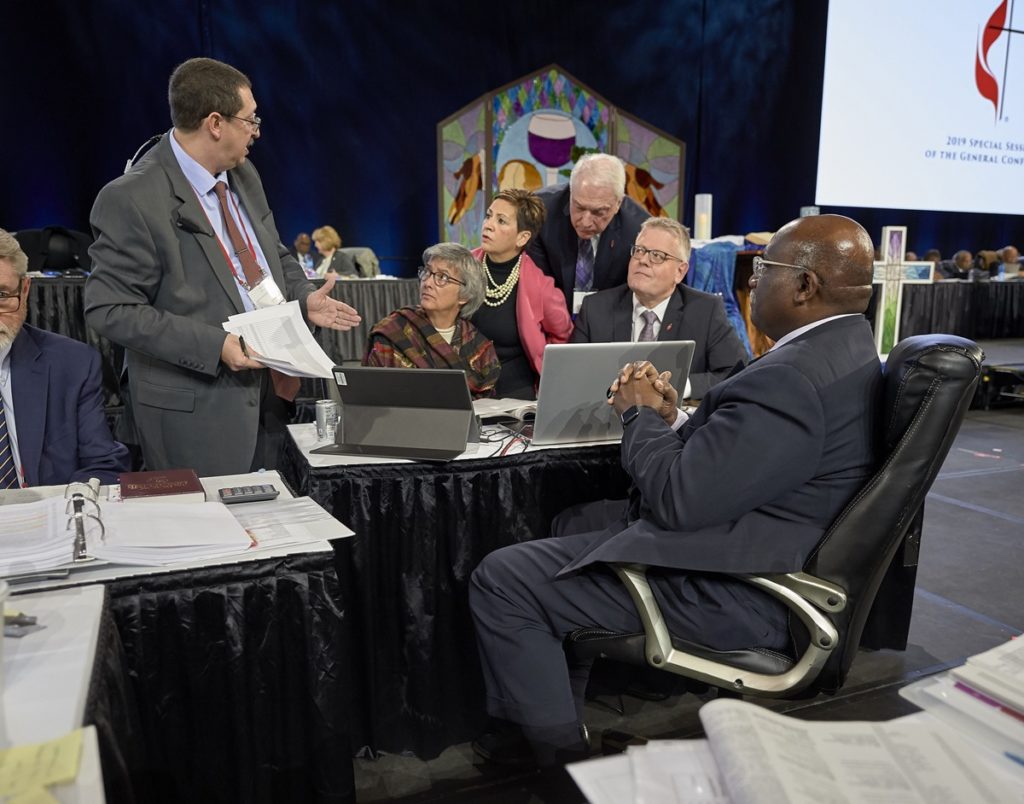
Judicial Council asked to rule on Traditional Plan… again
(UMNS) Just as the business portion of General Conference 2019 (Special Session) was ending on Tuesday, Feb. 26, delegates voted 405 to 395 to send the UMC’s Judicial Council a surprising last-minute request. It asked for a declaratory decision on the constitutionality of the entire Traditional Plan, which the conference had passed that day.
The council will address that request at its next scheduled meeting April 23-25 in Evanston, Illinois.
The church’s Supreme Court had already delivered a declaratory decision that morning, from a request the night before, on the constitutionality of all legislation that the conference had passed so far—that is 17 petitions related to the Traditional Plan and two disaffiliation plans.
On Tuesday morning, the Judicial Council issued Decision 1377, which deemed nine petitions unconstitutional and one other partially unconstitutional.
The nine petitions deal with subjects such as episcopal accountability and responsibilities, composition of boards of ordained ministry, the examination of candidates for ministry by the boards of ordained ministry and disaffiliation, or procedures for churches that want to leave.
The rationale for much of Decision 1377 referred to Decision 1366, the outcome of the council’s review of the Traditional Plan and One Church Plan during its October meeting in Zurich, Switzerland.
The Judicial Council on Monday had ruled two Traditional Plan and Modified Traditional Plan petitions unconstitutional that related to who gets to evaluate clergy suitability to serve in ordained ministry and who gets to judge bishops’ alleged violations of the Discipline.
Petition 90052 was unconstitutional, the court said in Decision 1375, “because it infringes upon the right of the annual conference to vote on all matters relating to the character and conference relations of its clergy members,” as provided under Paragraph 33 of the constitution.
Petition 90078 was ruled unconstitutional because it would create a global episcopacy committee, the decision said. That petition was part of the Modified Traditional Plan. Learn more…
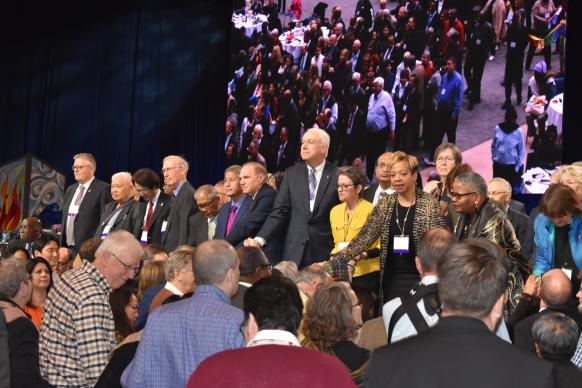
Bishops issue post-GC2019 statement
Read a Feb. 26 statement from the Council of Bishops, following the end of the General Conference Special Session: “General Conference maintains language on ordination of LGBTQI persons, same-gender marriages in The United Methodist Church.”
What is the Traditional Plan?
“The Traditional Plan keeps the current language around sexuality and increases accountability by streamlining the processes to enforce penalties for violations of The Book of Discipline related to marriage and ordination of LGBTQI persons,” reads the statement. “Some parts of the Traditional Plan were ruled unconstitutional, and it will take some time to clarify which parts will become part of our church law and which parts will not.”
“We continue to teach and believe that all persons are welcomed in the church, all persons are persons of sacred worth and we welcome all to receive the ministry of Jesus. Human sexuality is a topic on which people of faith have differing views,” said Bishop Ken Carter, president of the Council of Bishops, after the conference ended. “Despite our differences, we will continue to work together to make disciples of Jesus Christ for the transformation of the world and share God’s love with all people.”
What is the next step for the UMC?
Since the legislation is not the official church law until January 1, 2020, the bishops are urging all United Methodists to stay focused on the mission that glorifies God and reaches new people with the gospel. Bishops will be holding meetings with clergy and laity in their annual conferences on how details will be handled in each area.
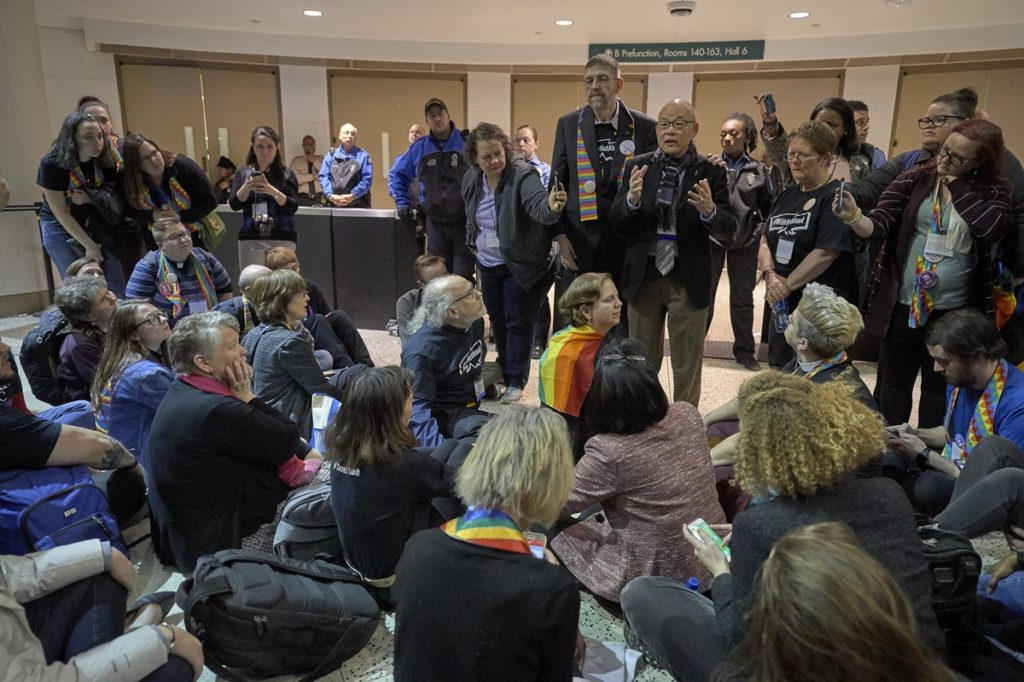
Conflict defines General Conference aimed at unity
By Sam Hodges, UMNS
United Methodists tried to come to terms with a General Conference that was meant to unify but instead underscored divisions and had all sides acknowledging a high level of pain.
“Catastrophic” was the summary judgment of the Rev. James Howell, a Western North Carolina Conference delegate. “The church as we’ve known it will not be. It’s going to fracture in ways — different ways,” he said.
Patricia Miller served on the Special Commission on a Way Forward that bishops appointed to help come up with legislative options for addressing the denomination’s impasse on homosexuality. The Traditionalist Plan she supported prevailed. “There is no joy for any of us in this whole debate,” said Miller. “It’s painful for all of us.”…
In the end, delegates passed by a 438-384 margin the Traditional Plan, which retains church law restrictions against homosexuality and seeks stricter enforcement….
The response on the last day of General Conference by supporters of full inclusion for LGBTQ persons included multiple demonstrations, tearful and often angry floor speeches, accusations of ethics violations by traditionalist organizers, and challenges to parliamentary decisions by a presiding bishop. Learn more…
See more General Conference photos on UMNS’s Flickr page.
